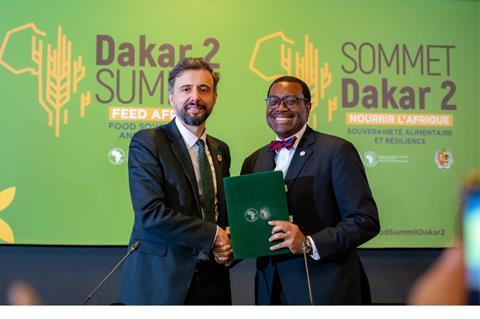The African Development Bank and IFAD have teamed up on a joint mission to reduce Africa’s dependence on food imports and build sustainable food systems
The African Development Bank (AfDB) and the UN’s International Fund for Agricultural Development (IFAD) have signed a letter of intent in support of the pan-African Mission 1 for 200 (M1-200), a joint initiative to “reduce Africa’s food import dependency, and build sustainable, inclusive and climate-adapted food systems”.
“The current convergence of crises has exposed the underlying structural issues affecting agriculture and food systems,” said IFAD President Alvaro Lario. “Many countries in Africa need to find solutions now to avert more extreme consequences.”
In Africa, high fertiliser prices are hampering production in many low-income countries, while food supplies are impacted by the war in Ukraine and the effect of the climate crisis in many countries.
The result has been an 8.5 percent rise in the cost of a typical food basket in Africa since 2020, according to data from the International Monetary Fund.
In addition, due to high interest rates and currency depreciation, many low-income countries are exposed to debt default.
“Only investments in agriculture that support small-scale farmers will get us out of this worrying downward spiral of crisis after crisis,” said Lario. “Strategic investments will boost agricultural productivity, they will build food sovereignty and they will pave the way for a more equitable distribution and access to food, bringing opportunities for all.”

M1-200 aims to attract investments to boost small and medium enterprises in the agriculture sector. “Africa’s agribusiness sector is projected to output US$1tr by 2030 and presents a sound business opportunity for investors,” said Lario.
“Only investments in agriculture that support small-scale farmers will get us out of this worrying downward spiral of crisis after crisis,” said Lario. “Strategic investments will boost agricultural productivity, they will build food sovereignty and they will pave the way for a more equitable distribution and access to food, bringing opportunities for all.”
M1-200 builds on AfDB’s flagship Feed Africa strategy and complements IFAD’s core programmes, including investments in inclusive rural transformation, agricultural development, nutrition and food security, and climate adaptation, with small-scale farmers regarded as the cornerstone of food systems transformation.
The new agreement also reinforces IFAD and AfBD’s previous commitment to double productivity through expanding existing agro-technologies, investing in access to markets and promoting agricultural research and development.



